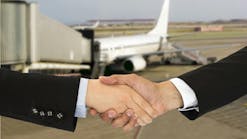Should Private Jet Travel Face More Taxes And/Or Surcharges?
Private jet travel has become a heated topic in the last few years, largely because of its impact on the environment, and some are calling for new taxes.
Unlike commercial flights, private jets have an oversized kick to the environment because they carry fewer passengers.
Private jet passengers pay less than commercial passengers in terms of taxes and surcharges, said a recent study by the Institute for Policy Studies and Patriotic Millionaires, an affluent organization that promotes higher taxes on themselves.
American commercial airline passengers pay a 7.5 percent tax on tickets, as well as a facility charge of around $4.50 per segment. Private fliers only pay fuel surcharge taxes of about 22 cents a gallon, according to the analysis.
Critics argue air travel infrastructure is designed largely to suit the needs of large commercial planes, so it made sense for commercial airliners to bear a larger share of the cost of maintaining the system.
Q: Should private jet travel face more taxes and/or surcharges?
Jamie Moraga, Franklin Revere
NO:Private and business jet travelers already pay significant taxes and/or surcharges. Adding more can increase overall business expenses and hinder business opportunities. Private jet travel has increased since the pandemic and is more accessible due to charters, memberships and fly-sharing. A carrot versus stick approach could be more expeditious — offer incentives to switch to lower-carbon aircraft and fuels to meet the goal of net zero emissions sooner than 2050. Anytime a tax is imposed it has a trickle-down effect, which can impact the economy. We should be reducing taxes not creating more.
David Ely, San Diego State University
YES:Taxes and surcharges should be closely aligned with a flight's emissions and to the costs it imposes on the aviation network. The impact on the climate from traveling on a private jet, on a per-passenger basis, greatly exceeds that of traveling on a typical commercial flight. Private jets must be handled by the FAA and are more costly per passenger compared to commercial flights. Taxes could be better aligned with these factors.
Ray Major, SANDAG
YES: It only makes sense that private jet users pay proportionally the same amount in taxes as commercial airliners. In some cases, private jets are used by the ultra-wealthy for fun and convenience, creating more environmental impacts than if the trips were combined with commercial flights headed for the same destination. Having commercial air passengers subsidize private flights unfairly places the burden on those who can less afford it.
Caroline Freund, UC San Diego School of Global Policy and Strategy
YES: Private jet travel is a luxury for the super-rich that hurts the rest of us and the planet. Punitive taxes on private jet travel would reduce carbon emissions and be progressive. The revenue from taxes and surcharges could be used for much-needed investment in public transport and renewables.
Haney Hong, San Diego County Taxpayers Assoc.
Not participating this week.
Kelly Cunningham, San Diego Institute for Economic Research
Not participating this week.
Lynn Reaser, economist
YES:Private jets should be viewed as primarily a necessary business expense. Bizjet owners should not have to pay for the use of commercial terminals. They pay separate fees to fixed base operators. Paying for the Aviation Trust Fund that funds the FAA based on usage would require a wholesale restructuring of the system. It would have to apply to cargo airlines, other general aviation, commercial airlines, and other users of the airspace in addition to private jets.
Phil Blair, Manpower
YES: Private planes should pay their fair share, but not only gas taxes. If a plane that holds six passengers and one that holds 130 people tie up a runway for the same amount of time they should pay the same price for use of that runway.
Gary London, London Moeder Advisors
YES:I'm persuaded by the reports of taxing inequities between private jets and commercial transportation. Slightly higher fees are not likely to significantly impact private jet patronage. I would also be in favor of a climate tax surcharge on private jets, as their use does burn fuel that would not otherwise be burned if their patrons flew commercial. The surcharge might fund climate-friendly power sourcing and incentivize clean energy solutions to travel.
Alan Gin, University of San Diego
YES: The environmental damage done by private jets is an example of a negative externality. With negative externalities, too much of something is done because people don't consider the external costs of their actions on the economy and society. One way to deal with negative externalities is to impose a tax on the activity equivalent to those external costs. The tax would not be a regressive one since it is high-income individuals and companies that use private jets.
Bob Rauch, R.A. Rauch & Associates
YES:There is a disparity between what John Q. Public pays and what private jet owners pay in fuel surcharges. However, the bigger concern I have is the "self-regulating" features of private jet security. TSA oversight of private jets is needed and law enforcement should know who are the beneficial owners of private jets. The FAA should approve a certificate of registration in the United States only after knowing exactly who the owner is.
Kirti Gupta, Qualcomm
Not participating this week.
James Hamilton, UC San Diego
YES:The government collects a lot of taxes from air travel. But many of these taxes are on a per-passenger basis. Private jets account for 16 percent of U.S. flights but pay only 2 percent of the taxes. When companies write off costs of private jets as a business expense, that's another implicit government subsidy. We should tax private jets based on their total effects on the environment rather than the number of passengers.
Austin Neudecker, Weave Growth
YES:Private jet pollution is a negative externality imposed on everyone with little consequence to the producer. As a society, we should strive to capture externalities and place the costs back on the creator. By not doing so, we encourage the waste to continue. Pollution, excess waste and chemical contamination boost private profits at the expense of our health, safety, and purses (through taxes). Private jets produce 10 times more pollutants than commercial jets and should be taxed accordingly.
Chris Van Gorder, Scripps Health
NO: I'm a fan of a flat tax with limited deductions rather than piecemeal taxation. There is too much focus on increasing taxes or adding more taxes and fees. It's impacting the middle class as well as the wealthy. In this case, it might be better to eliminate tax breaks and deductions private jet owners can take rather than implement a new tax. The result would be the same — more revenue for the government, which is clearly the goal.
Norm Miller, University of San Diego
NO:Over 80 percent of private jets use regional or small-town airports, so there is no reason to tax them for commercial terminal infrastructure. When private jets are too large for smaller airports, they should pay a commercial use fee. Commercial jets are significantly more efficient than automobiles for longer distances. As to short flights and carbon waste, the percentage of ego-driven passengers that can afford this is too small to measure and there is no need to gaslight class wars.
Have an idea for an EconoMeter question? Email me at [email protected]. Follow me on Twitter: @PhillipMolnar
This story originally appeared in San Diego Union-Tribune.
©2023 The San Diego Union-Tribune. Visit sandiegouniontribune.com. Distributed by Tribune Content Agency, LLC.




